No 10 says no change on public sector pay policy
- Published
- comments
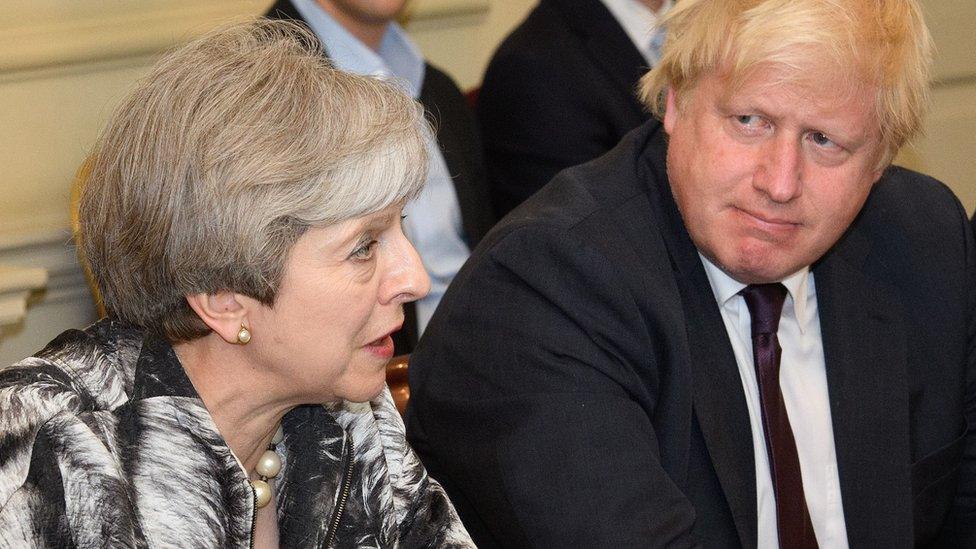
Downing Street insists its position on public sector pay has not changed despite several ministers calling for the 1% cap on increases to be scrapped.
Foreign Secretary Boris Johnson is the latest senior cabinet minister to put pressure on the chancellor and the PM to change the policy.
No 10 said ministers would respond to pay review bodies in due course.
But 1% rises for dentists, nurses, doctors and the military have already been agreed for this year, it added.
When the matter was raised in the Commons, a minister said the government wanted to ensure "frontline public service workers" were "paid fairly for their work".
Nick Hurd, a policing minister, told MPs how to do this was "under active discussion".
A Whitehall source said Mr Johnson "strongly" believed pay rises could be achieved in "a responsible way", without putting undue pressure on the public finances.
The Institute for Fiscal Studies has estimated, external that increasing public sector pay in line with the private sector would cost an extra £6.3bn a year.
In the Queen's Speech debate last month, Mr Hammond made clear his aversion to higher borrowing.

Are you a public sector worker affected by these issues? Let us know by emailing haveyoursay@bbc.co.uk, external

However, on Sunday Mr Gove, the environment secretary, appeared to reject suggestions that taxes would need to go up to meet the cost of any pay rises.
Pay rises for most public sector workers are set by independent pay review bodies, but have effectively been capped at 1% each year since 2013.
Before that, there was a two-year freeze on pay for all but the lowest-paid workers.
In addition to the 1% annual rise, some NHS staff also get incremental increases as they progress in their roles.
The Conservatives went into the election planning to maintain the cap until 2020, but there are growing calls for a rethink after the party lost its majority in the general election.
"If you are taking the government shilling, you need to stick to the government line" says Tory MP Stephen Crabb
The pay review bodies cover a wide range of professions, from prison officers and nurses, to judges and senior NHS managers.
Those covering police and teachers' pay are due to report this month. The cap has been applied across the UK, but the Scottish government has said it plans to end it in Scotland.

Analysis
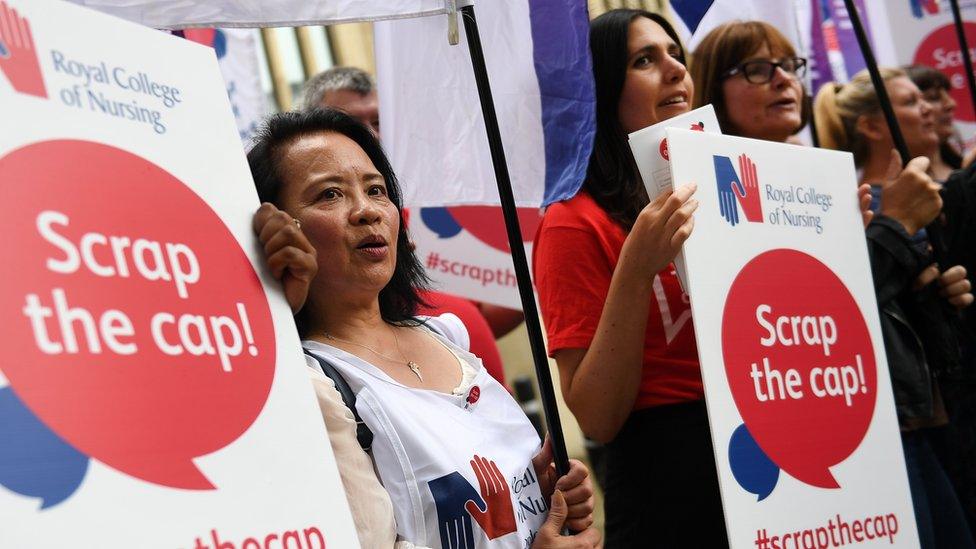
Nurses last month held protests against the public sector pay cap
BBC political editor Laura Kuenssberg
Arguably the simpler part of the debate has been had - many public sector workers are feeling the pinch, and there is more and more pressure to remove the limit on pay rises. The more complicated bit, who or what would pay for the increase, is a conversation that's yet to happen.
Whatever Boris Johnson and Michael Gove have said in the last twenty four hours, don't expect anything to happen in a hurry. The first pay review body is not due to report for another few weeks.
It seems unlikely that the government will announce any plan to either ditch the cap or promise to accept the decisions of the review bodies before then.
It's not in either Theresa May or Philip Hammond's DNA to make quick decisions. Read more from Laura

Former Conservative Chancellor Lord Lamont told BBC Radio 4's Today programme public sector pay was on average higher than in the private sector and controlling it was "extremely important".
He said cases could be looked at where there were specific issues around recruitment but objected to the "general pressure that's being applied, the idea that we should abandon restraint of public expenditure".
He said people should not criticise austerity in the same way they might discuss "too many repeats on television" and said it was not right for cabinet ministers to "gang up" on Mr Hammond, saying they were making the chancellor's position "very awkward".
"This is not a choice," he added.
"It is unavoidable that we have restraint on public spending."
Institute for Fiscal Studies director Paul Johnson said "within the scale of things" Mr Hammond could "afford a few billions here and there", but added the chancellor would be worried that if he gives money to one part of the public sector he will come under pressure to do the same in other areas.

How public sector pay is set
Decisions on public sector pay are taken by the government after receiving recommendations from independent 'pay review bodies'
There are eight of these, which each make their own recommendations for different sectors of the 5.4m public sector workforce
They have six to eight members, who are appointed by ministers, and produce their recommendations at different points during the year
In reaching a recommendation they have to consider the need to "recruit, retain and motivate" staff
They also need to consider the "financial circumstances" of the government
Since the 2010 Budget, it has been government policy for public sector pay to be frozen or, more recently, capped at 1%
Pay review bodies are able to recommend higher increases despite this policy, although the former chairman of several bodies, Alasdair Smith, told the BBC to do so would be a "big step"
Civil servants have also been subject to the 1% cap, although they are not covered by pay review bodies
Individual government departments have responsibility for implementing pay policy following guidelines set by the Treasury

NHS Confederation chairman and former Tory minister Stephen Dorrell said the pay review bodies should not be "artificially constrained" by the 1% policy, saying health service staff needed to be "properly looked after".
And former cabinet minister Stephen Crabb said ministers who disagreed with the official government policy should not be in the cabinet.
"I don't think it's a great sight seeing different cabinet members giving slightly different messages to the media," he told BBC Radio 4's The World at One.
Speaking on Sunday, Mr Gove did not call directly for the 1% cap to be lifted, but said ministers should respect the "integrity" of the pay review process.
Last week Labour attempted to scrap the 1% cap but was defeated in Parliament.
Ex-chancellor Lamont: Stop ganging up on Hammond
Gove's quick-fire answers on the Andrew Marr show - Brexit and his return to the cabinet
Shadow health secretary Jonathan Ashworth said reports on the divisions within government over public sector pay revealed there was "turmoil" in the Conservative Party.
"They're saying 'Wait for the pay review bodies', even though they're the ones insisting on a 1% cap," the Labour frontbencher told the Andrew Marr Show on Sunday.
"We're saying to the pay review bodies: 'Get rid of the 1% cap and give a fair pay rise.'"
Asked what level of pay rise Labour thought was fair, Mr Ashworth said the pay review bodies should consider one in line with the rise in average earnings across the economy.


- Published2 July 2017
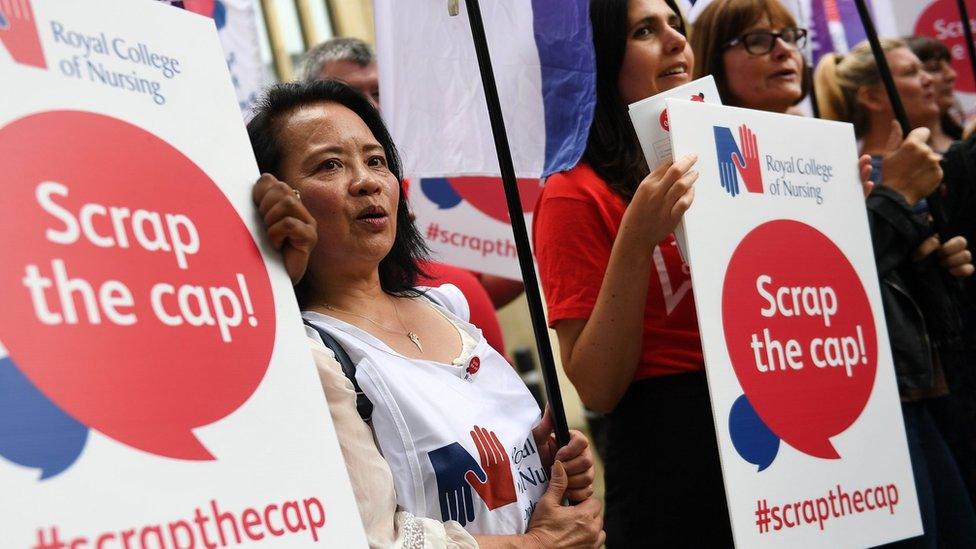
- Published1 July 2017
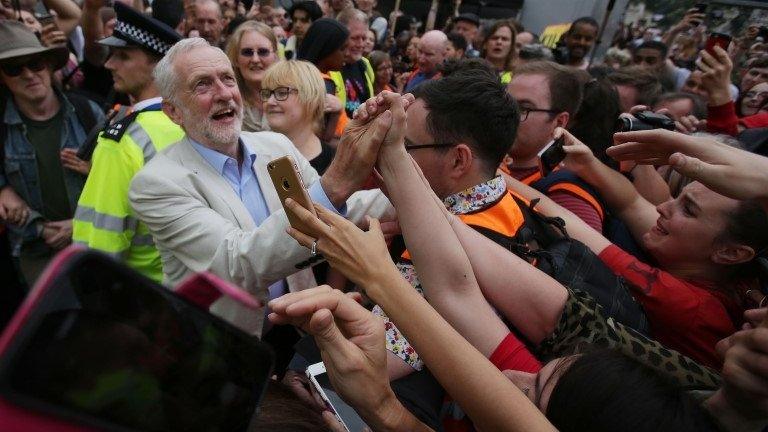
- Published28 June 2017
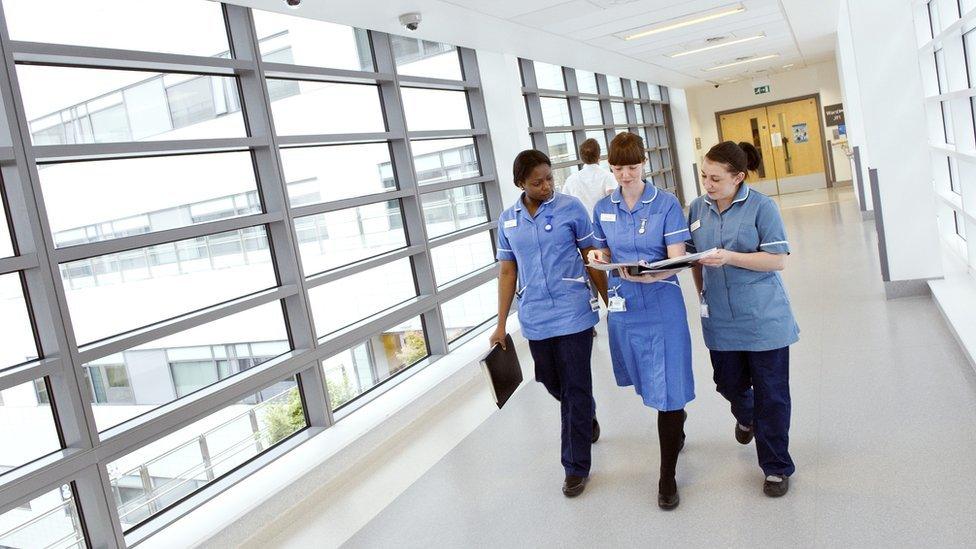
- Published13 June 2017
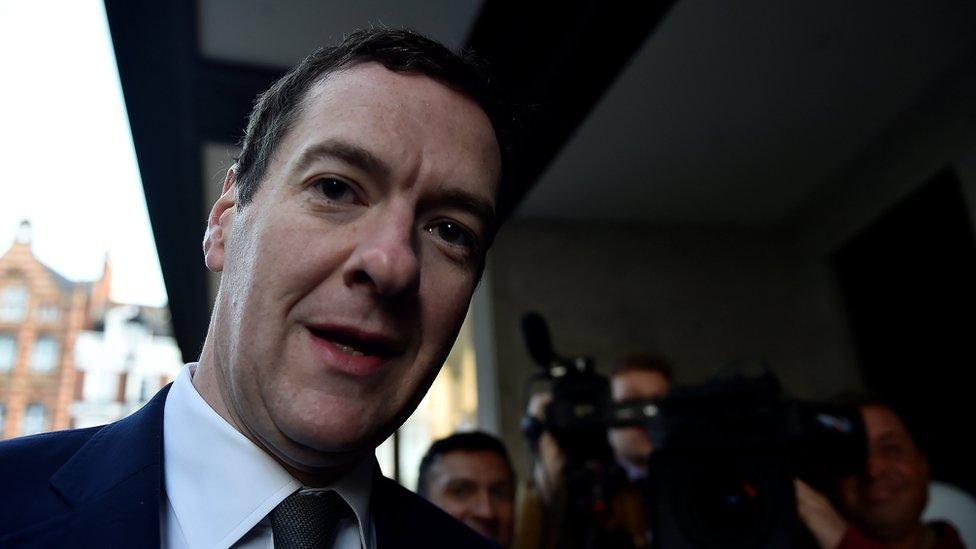
- Published9 June 2017